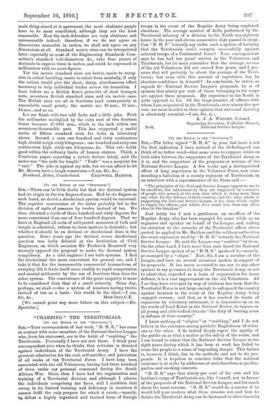[TO THE EDITOR OF THE " SPECTATOR."1
SIR,—The letter signed "D. H. S." in your last issue is not the first indication I have noticed of the ill-feeling—I can think of no better word—that some seem to suppose exists on both sides between the supporters of the Territorial Army as
it is, and the supporters of the proposals or scheme of the National Service League. A few weeks ago a distinguished officer of long experience in the Volunteer Force, now com-
manding a battalion of a county regiment of Territorials, in an interview with a representative of the Press said :—
" The principles of the National Service League appear to me to be excellent, but unfortunately they are supported by a number of people who preach at the very class which is doing more than any other for the defence of their country, and the class whioh is supporting the National Service League is the class which ought to supply the officers, and which does much less than any other class in the kingdom."
Just lately too I met a gentleman, an ex-officer of the Regular Army, who has been engaged for some while as an organiser and speaker on behalf of the League, and, calling his attention to the remarks of the Territorial officer above quoted, he applied to Mr. Haldane and the military authorities the exact expression used by "D. H. S." towards the National Service League. He said the League was "crabbed " by them.
On the other hand, I have more than once heard the National Service League spoken of as " D. H. S." speaks of it,—namely, as managed by a " clique." Now, Sir, I am a member of the League, and have on several occasions spoken in support of its proposals. It has never occurred to me, nor fo any other speaker in my presence, to decry the Territorial Army, or not to admit that, regarded as a basis of organisation for home defence, it is a vast improvement on the old Volunteers. All I or they have ever said by way of criticism has been that the Territorial Force is not large enough to safeguard the country against invasion in the event of the Regular Army being engaged oversea ; and that, as it has reached its limits of expansion by voluntary enlistment, it is imperative on us, in the words of Lord Esher in the National Review, to impose on all young and able-bodied citizens " the duty of bearing arms in defence of their country."
I know nothing of " cliques " or "crabbing," and I do not believe in the existence among patriotic Englishmen of either one or the other. I do indeed deeply regret the apathy of the public on so vital a matter as the safety of the realm, and I am bound to admit that the National Service League in the eight years during which it has been at work has failed to rouse the people to a sense of impending danger. This failure is, however, I think, due to its methods and not to its pro- posals. It is hopeless to convince folks that the national existence is at stake by addresses at such functions as garden- parties and smoking concerts.
"D. II. S." says that ninety per cent. of his own and his brother's corps of Territorials are, like himself, not in favour of the proposals of the National Service League, and for much about the same reasons. "D. H. S." would do a service if he would tell your readers what these reasons are, and how ho thinks the Territorial Army can be increased to three times its present strength (Lord Roberts's irreducible minimum) without recourse to compulsion.—I am, Sir, &c., C. W. R. O.







































 Previous page
Previous page